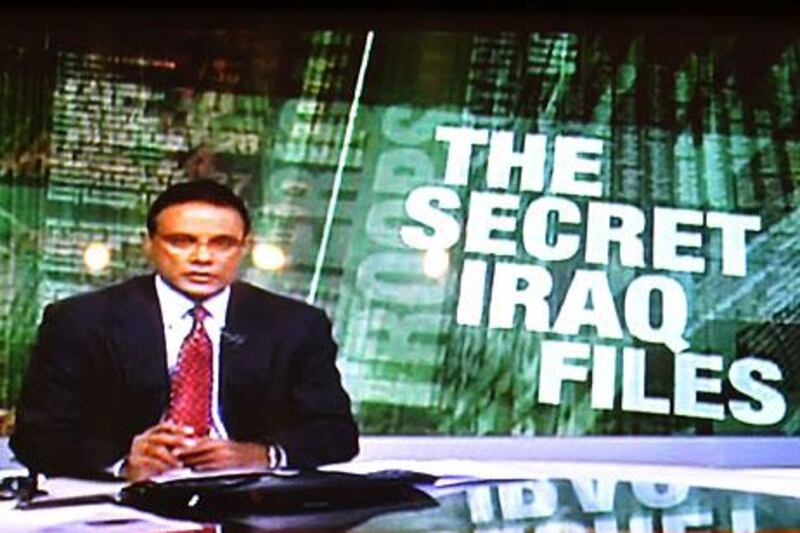LONDON // Graphic accounts of torture, civilian killings and Iran's hand in the Iraq war are detailed in hundreds of thousands of US military documents made public on the whistleblower website WikiLeaks.
Across nearly 400,000 pages of secret military field reports spanning five years, the largest military leak in history, a grisly picture emerges of years of blood and suffering following the 2003 US invasion to oust Saddam Hussein.
Many of the classified documents, which span from January 1, 2004 to December 31, 2009, chronicle claims of abuse by Iraqi security forces, while others appear to show that American troops did nothing to stop state-sanctioned torture.
The documents, made public on Friday, comprise the second such release from the controversial website, which accused the United States of "war crimes" and earlier released some 92,000 similar secret military files detailing operations in Afghanistan.
Website founder Julian Assange said the files reveal a "bloodbath" in previously unseen detail.
"These documents reveal six years of the Iraq war at a ground level detail -- the troops on the ground, their reports, what they were seeing, what they were saying and what they were doing," he told CNN.
"We're talking about a five times greater kill rate in Iraq, really a comparative bloodbath compared to Afghanistan."
WikiLeaks made the files available to The Guardian newspaper, the New York Times, Le Monde and Der Spiegel weeks ago, then just before their publication sent a Twitter message to select journalists, in a secretive invite that turned out to be a three-hour lock-in preview of the documents.
In one report, US military personnel describe detainee abuse by Iraqis at a facility in Baghdad that is holding 95 detainees in a single room where they are "sitting cross-legged with blindfolds, all facing the same direction."
It says "many of them bear marks of abuse to include cigarette burns, bruising consistent with beatings and open sores... according to one of the detainees questioned on site, 12 detainees have died of disease in recent weeks."
Other reports describe Iraqis beating prisoners and civilian women being killed at US military checkpoints.
The Guardian newspaper said the leak showed "US authorities failed to investigate hundreds of reports of abuse, torture, rape and even murder by Iraqi police and soldiers whose conduct appears to be systematic and normally unpunished."
It added that "more than 15,000 civilians died in previously unknown incidents," going on to say that "US and UK officials have insisted that no official record of civilian casualties exists but the logs record 66,081 non-combatant deaths out of a total of 109,000 fatalities."
And The Guardian said the "numerous" reports of detainee abuse, often supported by medical evidence, "describe prisoners shackled, blindfolded and hung by wrists or ankles, and subjected to whipping, punching, kicking or electric shocks." It added: "Six reports end with a detainee's apparent death."
The Guardian said WikiLeaks is thought to have obtained the electronic archive from the "same dissident US army intelligence analyst" who leaked 90,000 logs about the war in Afghanistan this year. WikiLeaks has not revealed its source.
Al-Jazeera concluded that major findings of the leaked papers included a US military cover-up of Iraqi state-sanctioned torture and "hundreds" of civilians deaths at manned American checkpoints after the US-led invasion of 2003.
On Iran's role in the conflict, the secret US files show Tehran waging a shadow war with US troops in Iraq, with a firefight erupting on the border and Tehran allegedly using militias to kill and kidnap American soldiers.
The documents describe Iran arming and training Iraqi hit squads to carry out attacks on coalition troops and Iraqi government officials, with the elite Iranian Revolutionary Guard Corps suspected of playing a crucial role, The Times and The Guardian reported, citing the files.
Attacks backed by Iran persisted after US President Barack Obama took office in January 2009, with no sign that the new leader's more conciliatory tone led to any change in Tehran's support for the militias, The New York Times wrote.
The documents describe accounts from detainees, the diary of a captured militant and the discovery of numerous weapons caches as proof of Iran's designs.
US Secretary of State Hillary Clinton condemned "in the most clear terms" the leaks of any documents putting Americans at risk, while the Pentagon warned that releasing secret military documents could endanger US troops and Iraqi civilians.
"By disclosing such sensitive information, WikiLeaks continues to put at risk the lives of our troops, their coalition partners and those Iraqis and Afghans working with us," Pentagon press secretary Geoff Morrell said.
He said the documents were "essentially snapshots of events, both tragic and mundane, and do not tell the whole story".
But Democratic Congressman Dennis Kucinich of Ohio said the release of the documents underscored the need for the US government to provide "a true accounting" of the war in Iraq.
"The American people have a right to know how many innocent civilians were killed in a war based on lies," Kucinich said in a statement. "It is possible that more than a million innocent civilians have perished as a result of the invasion and the ensuing war."





